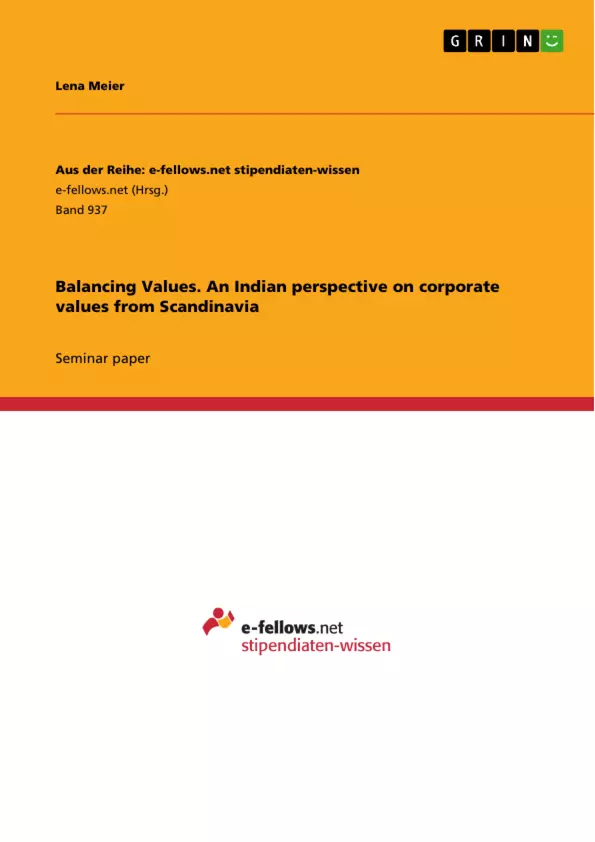Pharmaz is a multinational pharmaceutical company, which headquarter is located in
Denmark. Worldwide, Pharmaz employs around 6000 people in 30 countries.
Currently, the management concentrates on presenting Pharmaz as a value-driven and
innovative company. As a result, the following three corporate values should be focused
prospectively (Dowling, Festing & Engle 2013, p. 319):
1. Empowerment of all employees,
2. Equal opportunities for developing the employees' competencies,
3. Openness in communication associated with knowledge exchange.
Furthermore, a focus for Pharmaz is the growth of the Indian subsidiary. It gains strategic
importance, more people shall be recruited and the management likes to take advantage of the
low cost, professional Indians.
Accordingly, Amrita Chopra, the senior financial manager of Pharmaz India, and Niels
Nielsen, the finance director of Pharmaz India (Dowling, Festing & Engle 2013, p. 322),
discuss the alignment of local work procedures. (Dowling, Festing & Engle 2013, p. 319)
In sum, Pharmaz reflects a company's cultural differences between Denmark and India, while
the Danish executives try to apply its new values. Also, the company represents the huge
managers' efforts that are required for the change. [...]
Table of Contents
- Introduction
- Main issues raised at Pharmaz associated with the differing cultural and institutional contexts of Pharmaz Denmark and India
- Key components of Amrita's approach for implementing the corporate values in India
- Suggestions for improvements of Amrita's approach
Objectives and Key Themes
This analysis explores the challenges faced by Pharmaz, a Danish pharmaceutical company, in implementing its corporate values in its Indian subsidiary. The case study highlights the cultural and institutional differences between Denmark and India, demonstrating the complexities of managing a multinational workforce.
- Cultural differences in work ethics and expectations.
- Impact of national culture on employee empowerment and decision-making.
- Challenges in communication and leadership styles across cultures.
- Strategies for implementing corporate values in diverse contexts.
- Importance of understanding and adapting to local work environments.
Chapter Summaries
- Introduction: This chapter introduces the case study of Pharmaz, highlighting the company's global operations and the focus on implementing corporate values in its Indian subsidiary. It also introduces the main characters: Amrita Chopra, the senior financial manager of Pharmaz India, and Niels Nielsen, the finance director.
- Main issues raised at Pharmaz associated with the differing cultural and institutional contexts of Pharmaz Denmark and India: This chapter delves into three main issues stemming from the cultural differences between Denmark and India: employee independency, interdepartmental misunderstandings, and different perspectives in communication. The analysis highlights the challenges faced by Pharmaz in reconciling its corporate values with the local work culture in India.
- Key components of Amrita's approach for implementing the corporate values in India: This chapter outlines Amrita's approach to implementing Pharmaz's corporate values in India. Her approach emphasizes careful development, a more hierarchical structure, and a reward system to motivate employees. The chapter also discusses the oppositional views of Niels Nielsen, who struggles to understand and accept Amrita's approach.
Keywords
The primary focus of this case study revolves around the interplay of corporate values, national culture, and organizational change. Key terms include cultural differences, employee empowerment, communication styles, leadership, organizational adaptation, and the implementation of corporate values in diverse contexts. The analysis draws upon research by Geert Hofstede, who developed a framework for understanding cross-cultural differences, and Bob Hayward, whose work highlights the importance of adapting organizational change to local environments.
Frequently Asked Questions
What are the core corporate values of Pharmaz?
The company focuses on three prospective values: empowerment of all employees, equal opportunities for competency development, and openness in communication associated with knowledge exchange.
Where is the headquarters of Pharmaz located?
Pharmaz is a multinational pharmaceutical company with its headquarters located in Denmark.
What are the main cultural challenges between Pharmaz Denmark and India?
Key issues include differences in employee independence, interdepartmental misunderstandings, and varying cultural perspectives on communication and leadership styles.
Who are the key people discussed in the Pharmaz India case study?
The case study focuses on Amrita Chopra, the senior financial manager of Pharmaz India, and Niels Nielsen, the finance director of Pharmaz India.
How does Amrita Chopra approach the implementation of values in India?
Amrita emphasizes a careful development process, a more hierarchical structure tailored to the local context, and a reward system to motivate employees.
Which theoretical frameworks are used to analyze these cultural differences?
The analysis draws upon Geert Hofstede's framework for cross-cultural differences and Bob Hayward's work on adapting organizational change to local environments.
- Citar trabajo
- Lena Meier (Autor), 2013, Balancing Values. An Indian perspective on corporate values from Scandinavia, Múnich, GRIN Verlag, https://www.grin.com/document/274922



